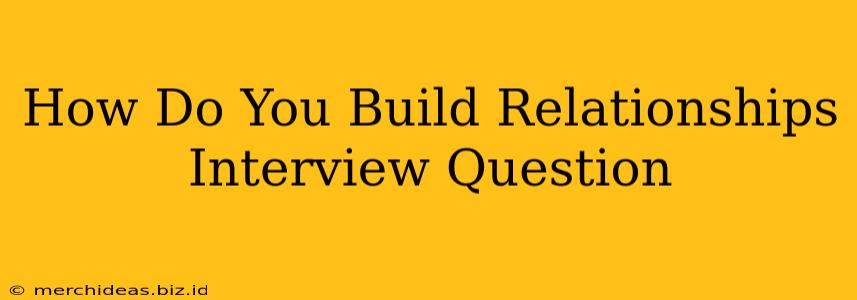How Do You Build Relationships? Interview Question: Ace Your Answer
The interview question, "How do you build relationships?" is a common one, designed to assess your interpersonal skills and collaborative abilities. Recruiters want to know if you can work effectively within a team, build rapport with clients, and contribute to a positive work environment. This isn't just about being friendly; it's about demonstrating a strategic approach to building strong, productive connections.
This guide will help you craft a compelling and insightful answer that showcases your relationship-building prowess and leaves a lasting positive impression on the interviewer.
Understanding the Underlying Intent
Before crafting your response, it's crucial to understand why interviewers ask this question. They're looking for evidence of:
- Active Listening: Do you genuinely listen to others, understand their perspectives, and respond thoughtfully?
- Empathy and Emotional Intelligence: Can you understand and respond appropriately to others' emotions and needs?
- Communication Skills: Can you clearly and effectively communicate your ideas and actively participate in conversations?
- Collaboration and Teamwork: Do you contribute positively to group efforts and build consensus?
- Networking and Relationship Management: Do you proactively build and maintain professional networks?
- Conflict Resolution: How do you navigate disagreements and maintain positive relationships despite challenges?
Crafting Your Winning Answer: A Structured Approach
A strong answer should follow a structured approach, incorporating specific examples to illustrate your points. Consider using the STAR method (Situation, Task, Action, Result) for each example:
- Start with a General Statement: Begin by outlining your overall philosophy on building relationships. For example:
"I believe strong relationships are built on mutual respect, trust, and open communication. I prioritize actively listening to understand others' perspectives and contributing to a collaborative environment."
- Provide Specific Examples: This is the most critical part. Choose 2-3 examples that showcase your skills in different contexts. For instance:
-
Example 1 (Teamwork): Describe a situation where you worked collaboratively on a project. Focus on how you actively listened to your team members' ideas, offered constructive feedback, and contributed to a positive team dynamic. Quantify your results whenever possible (e.g., "We successfully launched the project ahead of schedule and under budget").
-
Example 2 (Client Relationships): If relevant to the role, describe a time you built a strong relationship with a client. Highlight your efforts to understand their needs, address their concerns, and provide exceptional service. Mention specific outcomes (e.g., "I secured a long-term contract with the client based on their trust and satisfaction").
-
Example 3 (Mentorship or Networking): Describe a situation where you mentored someone or built a professional network. Show your ability to support others and build mutually beneficial connections.
- Highlight Key Skills: Explicitly mention the skills you utilized in each example. For instance:
- "In this situation, my active listening skills allowed me to quickly grasp the client's needs and propose solutions that exceeded their expectations."
- "My communication skills were essential in resolving conflicts and facilitating collaborative problem-solving within the team."
- "I developed my empathy through actively listening to the opinions and concerns of my team members, creating a more inclusive work environment."
- Conclude with Future Orientation: Finish by expressing your enthusiasm for building relationships within the company and contributing to its success.
"I'm confident that my approach to building relationships will enable me to quickly integrate into your team and contribute to a collaborative and productive work environment. I am eager to learn from my colleagues and contribute to the success of this company."
Common Pitfalls to Avoid
- Vague or Generic Answers: Avoid clichés like "I'm a people person." Provide concrete examples.
- Focusing Only on Social Aspects: While friendliness is important, emphasize professional aspects of building relationships.
- Lack of Specific Examples: Generic statements without supporting evidence are unconvincing.
- Negativity or Complaints: Avoid mentioning negative experiences or conflicts without focusing on how you resolved them constructively.
By following this structured approach and using the STAR method, you can craft a compelling answer that showcases your relationship-building skills and increases your chances of success in the interview. Remember to practice your answer beforehand to ensure it flows naturally and confidently. Good luck!
